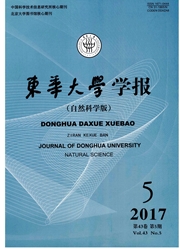

 中文摘要:
中文摘要:
探讨了带有递归偏好的投资者在考虑股票红利支付情形下的最优消费和投资组合.投资者担心模型的误定,因此寻求稳健的决策规则.假设股票的预期收益率遵循一个均值回复过程,在当投资者跨期替代弹性等于1和风险厌恶适中情形下,推导了最优消费和投资决策的显示解.通过数值模拟,发现模型不确定性厌恶增加了财富投资于股票的比例,同时股票支付红利也进一步加大了财富投资于股票的比例.
 英文摘要:
英文摘要:
The optimal consumption and portfolio for an investor with recursive preferences are explored. The investor worries about model misspecification, so the robust decision rules are sought. The expected returns of stocks is assumed to follow a mean-reverting process. When an investor's intertemporal elasticity of substitution is equal to one and the risk aversion is moderate, an exact analytical solution of the optimal consumption and portfolio is derived. By a numerical analysis, it is found that the aversion to model uncertainty increases the proportion of wealth invested in stocks, and the payments of stock dividends further increase the proportion of wealth invested in stocks.
 同期刊论文项目
同期刊论文项目
 同项目期刊论文
同项目期刊论文
 Existence and uniqueness for solutions to fuzzy stochastic differential equations driven by local ma
Existence and uniqueness for solutions to fuzzy stochastic differential equations driven by local ma On solutions to stochastic set differential equations of It^o type under the non-Lipschitzian condit
On solutions to stochastic set differential equations of It^o type under the non-Lipschitzian condit Empirical likelihood forheteroscedastic partially linear errors-in-variables model with -mixing erro
Empirical likelihood forheteroscedastic partially linear errors-in-variables model with -mixing erro Empirical likelihood forsemiparametric varying-coefficient heteroscedastic partially linearerrors-in
Empirical likelihood forsemiparametric varying-coefficient heteroscedastic partially linearerrors-in Optimal control of Markovian switching systems with applications to portfolio decisions under inflat
Optimal control of Markovian switching systems with applications to portfolio decisions under inflat Optimal consumption-leisure, portfolio and retirement selection based on alpha-maxmin expected CES u
Optimal consumption-leisure, portfolio and retirement selection based on alpha-maxmin expected CES u Optimal control of uncertain stochastic systems with Markovian switching and its applications to por
Optimal control of uncertain stochastic systems with Markovian switching and its applications to por Non-contact of solutions to stochastic differential equations driven by semimartingale with non-Lips
Non-contact of solutions to stochastic differential equations driven by semimartingale with non-Lips On small time large deviation principle for diffusion processes on Hilbert spaces under non-Lipschit
On small time large deviation principle for diffusion processes on Hilbert spaces under non-Lipschit Properties of Solutions to Stochastic Set Differential Equations under Non-Lipschitzian Coefficients
Properties of Solutions to Stochastic Set Differential Equations under Non-Lipschitzian Coefficients Optimal consumption-leisure, portfolio and retirement selection based on a-maxmin expected CES utili
Optimal consumption-leisure, portfolio and retirement selection based on a-maxmin expected CES utili DYNAMIC PORTFOLIO CHOICE UNDER THE TIME-VARYING, JUMPS, AND KNIGHT UNCERTAINTY OF ASSET RETURN PROCE
DYNAMIC PORTFOLIO CHOICE UNDER THE TIME-VARYING, JUMPS, AND KNIGHT UNCERTAINTY OF ASSET RETURN PROCE 期刊信息
期刊信息
